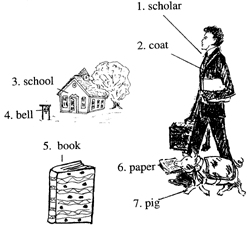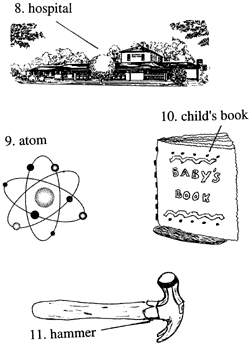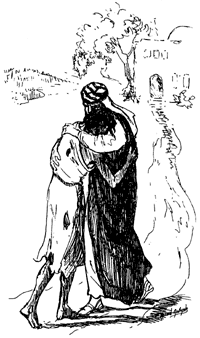Unit 25: Compounds
Pictured Words
New Words

| 1. scholar
|
| 2. coat
|
| 3. school
|
| 4. bell
|
| 5. book
|
| 6. paper
|
| 7. pig
|

| 8. hospital
|
| 9. atom
|
| 10. child's book
|
| 11. hammer
|
Nouns
Adjectives
Sayings
A hospital is a resting-place for those who have become ill.
I have something with a sharp-feeling in my throat, Can I get help anywhere?
A hospital will restore his radiation illness quickly.
Scholars are always straightforward people who never say an untruth.
Your before school time is to be quiet and not stressfull.
They give respectful attention to everything the authorities may say.
A hammer will put a nail straight into the wood.
Compounds
We saw in the last Stage how a noun may be used as an adjective before another noun to help give it additional qualities.
As examples, there were "hill-country", "servant-woman", "water-plants", "bride-price", and even proper nouns such as in “Hebrew women” and pronouns like in "she-goat".
This placing of words together to give special meanings is part of a grouping of words that is called compounds.
These are compounds which are made up of nouns.
Also, in this story, we have "nothing" and "man's hand", both of which are compound ideas.
There are a great many compounds used in English.
That is a quite common thing in many languages, and when you give it some thought, you may see that it takes place in your own language.
Most of the compounds made use of here are of this straightforward kind.
"Straightforward" itself is an example of a compound for it is made up of the two words, "straight" and "forward".
The two words have been joined together, the first one qualifying the second and so giving their meaning more direction and purpose.
However, they are not nouns.
But two or more nouns may be put together as in:
then "the chief wine-servant" said to Pharaoh.
where two nouns are just put alongside each other, whilst a third is seen joined by a dash (hyphen).
Similarly:
at their “night's resting-place”.
turning to “one another”.
The latter compound is an example where the word "another" serves as a noun but does not have two nouns in it.
Two separate helper words "an" and "other" are joined to make the one word, and each one is not a noun.
Similarly, "into" is a very common compound where the prepositions "to" and "in" are joined to make one word.
So, not all compounds are made up from nouns.

The Boy Who Came Back To His Father
And he said, a certain man had two sons: And the younger of them said to his father, Father, give me that part of your property which will be mine.
And he made division of his goods between them.
And not long after, the younger son got together everything which was his and took a journey into a far-away country, and there all his money went in foolish living.
And when everything was gone, there was no food to be had in that country, and he was in need.
And he went and put himself into the hands of one of the people of that country, and he sent him into his fields to give the pigs their food.
And so great was his need that he would have been glad to take the pigs' food, and no one gave him anything.
But when he came to his senses, he said, What numbers of my father's servants have bread enough, and more, while I am near to death here through need of food!
I will get up and go to my father, and will say to him, Father, I have done wrong, against heaven and in your eyes: I am no longer good enough to be named your son: make me like one of your servants.
And he got up and went to his father.
But while he was still far away, his father saw him and was moved with pity for him and went quickly and took him in his arms and gave him a kiss.
Additional Reading
There is a kind of song which goes by the name: "Negro Spiritual".
These songs were sung by people in hard conditions, who had the name of slaves.
They often said very great truths.
One of them says "All God's chillun got shoes".
"Chillun", of course, is another way of saying children.
"All God's children got shoes" is a saying that lets us see that God's children are important, because it was a sign of importance if they had shoes.
You see, slaves did not have shoes, and so they had value when they had shoes because they were no longer slaves.
And so it was in Jesus' country.
Slaves did not have shoes.
We are told later in the story that the father said to the servants: "Get out the best robe quickly and put it on him, and put a ring on his hand and shoes on his feet".
When the Father put shoes on his son's feet after he came back home, it gave a sign that his son was important.
When he put a ring on his finger it said that he had authority, because the ring gave the right to do the business of the father.
When he put a robe on him it gave a measure of honour to the son who had "come to his senses".
Now that was not at all what the son had in mind would be the welcome when he got back to his house.
He was willing to be like one of the father's servants.
And a servant had no rights in that country.
A slave was at least one of the family group, so he had a house and food.
But a common servant could be sent away at any time with only a day's word of notice.
Then he would be quite without support.
Whilst it was better to be a servant than to feed pigs, it was still not too good.
So, it must have seemed a great surprise to find the father had given so much to him.
The father saw him while he was still far away.
No doubt, he was looking out for him.
The father freely took his son back into the home.
He gave back all the good relations he had before he left.
It was very wrong for a Jew to give food to pigs.
The law said it was a crime.
But, the father did not see his son's bad record in that light.
He saw him as having a responsible place in the family.
This story gives us the feeling that its name should be "The Story of the Loving Father".
Jesus told the story to show us the natural qualities of God, even when such love may be an experience that is without parallel.
There is another true story about a famous President in America, who had the name, Lincoln.
When the wars were over in that country, a question was put to him about the persons who had had the bitter experience of loss.
What would he do with those many thousands of men?
He replied, "I will give them the same care as if they had never been away".
After all, he was only giving the same love as Jesus said the father gave his son.
Helpful Notes
| far-away country
| a country a long distance away.
|
| pig's food
| it was wrong for a Jew to be with pigs.
|
| slave
| a person without liberty.
|
| best robe
| the finest clothes.
|
| right to do business
| the ring was used as a stamp on agreements.
|
| day's word of notice
| said to a person just one day before.
|
| freely taken back
| received without trouble.
|
| without parallel
| with no equal.
|
| bitter experience of loss
| suffered defeat and possible loss of rights.
|
Interesting Facts And Records
Parables
A parable is a short story.
It makes use of facts and events in our normal way of life.
It also gives a special truth about life.
Greek and Roman writers made use of parables to give attention to wise things they had a desire to say.
A parable has a special place among English writers.
The stories of a man with the name, Hans Anderson, are well known to Englishmen.
The first language in which they were written was not English.
But they have been put into English and have a high approval because of the truths they make clear to their readers.
They are a sort of parable.
The greater number of the parables is to be found in the Scriptures.
A well known one is the story of Nathan the prophet.
He told King David about a man with much property who took hold of a poor man's sheep.
The poor man loved his little sheep.
It even had a place in his arms at the meal table.
The property owner would not kill one of his own sheep.
He killed the poor man's and gave it to a man who came to see him.
He filled his stomach with the poor man's sheep.
David was angry at this act.
But Nathan said to him, "You are the man.
You killed one of your fighting men to take his wife for yourself".
The best stories of this kind have come to us from Jesus.
He made use of them in his teaching about the nature of God.
These stories were His own special invention to give truths to his hearers.
The "Good Samaritan" was a parable about a man who transported a cruelly wounded man to a place of care and safety.
In those days, of course, there were no hospitals.
This parable shows the good quality of caring for others.
There is also a parable about "The Lost Sheep".
And there is the one about "The Boy Who Came Back to his Father".
They both say a lot about God's love for men